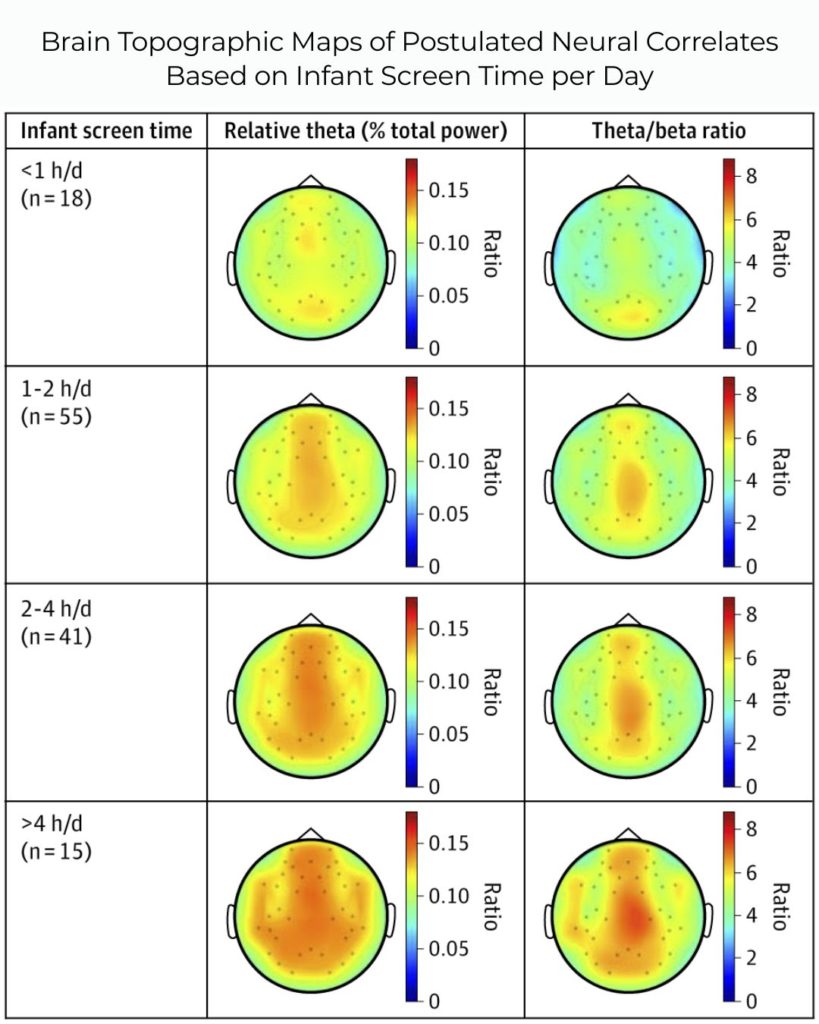Screens are everywhere. Phones, tablets, TVs, computers, they’ve become part of everyday life.
But here’s the question you need to ask: what happens when your baby spends hours staring at a screen?
Researchers now have answers.
A major study published in JAMA Pediatrics in 2023 tracked children from infancy to age nine. Research shows that excessive screen exposure during early childhood development leads to changes in brain function.
Why This Matters For Your Child
When your child stares at a screen, their brain isn’t resting.
Screen time often means bombarding a child’s brain with fast-paced movements, constant flashing of different colors, rapid scene changes, and so on.
All of this involves intense cognitive engagement. Thus, the brain becomes overstimulated, meaning it loses the ability to adequately direct resources for proper cognitive processing (including the development of the aforementioned executive functions).
The Role Of Executive Functions
Executive functions in the brain refer to all the abilities that lead to purposeful behavior, i.e. behavior directed towards a specific goal.
This part is where planning activities, creating strategies, and expressing emotions take place. These skills allow us to pay attention to what is important, inhibit our impulses, and assess the possible effects of our behavior before we act. They also allow us to divide a task, evaluate options, and plan and organize a material or an activity. Executive function is essentially a “conductor” that tells the rest of the brain how to work together to evaluate, organize, and execute an action.

Executive abilities develop all the time and continue to develop into adulthood. Already in the 8th month, the child’s working memory is activated, then from 2.5 to 5 years, attention, executive fictions, as well as thinking about oneself appear, and from 5 to 8 years – recognition, concept formation, selective attention and planning.
Children who have difficulties with the so-called “executive” functions have problems with controlling impulses, emotions, focusing and concentrating, and processing information.
All of the previously mentioned characteristics are of particular importance for the child’s performance in school.
The point of the aforementioned research in this context is that time spent in front of screens is one of the strong factors that can disrupt the development of “executive” functions.
What The Study Found
Scientists in Singapore followed over 400 children from birth to age nine.
The researchers found the following results.
Babies spent two hours per day watching screens at the age of 12 months. The recommended screen time for children under 18 months according to the American Academy of Pediatrics is zero except for video calls.
Children underwent EEG testing when they reached 18 months of age. EEG technology records brain wave activity to demonstrate how the brain handles information. Studies indicate that babies who spend too much time in front of screens develop abnormal brain wave patterns which result in difficulties with attention and decreased focus abilities.
The children underwent cognitive testing at the age of 9. Infants who spent the most time in front of screens during their first year of life demonstrated lower performance in working memory and impulse control and attention abilities.
The results were consistent.
The use of screens by infants resulted in decreased brain development throughout their growth process. The additional hour each day proved to be a significant factor.

What You Can Do Right Now
Limit Screen Time Early
Follow pediatric advice! No screens before 18 months, and only one hour per day of high-quality content for toddlers and preschoolers.
Choose Real-Life Interactions
Talk, play, and read with your child. Real-world activities produce superior brain development than spending time passively in front of screens.
Offer Healthier Alternatives
Your child develops abilities through outdoor activities and drawing and puzzles and reading books which screens do not provide.
Watch Together
Sit with your child. Explain what’s happening on screen. Ask questions. Co-viewing helps your child learn, while passive watching does not.
Model The Behavior You Want To See
Your child copies you. If you spend hours on your phone, your child will do the same. Set the example by putting devices aside when you’re together.

Advice For Parents
The goal of this initiative does not involve any prohibition of technological devices. Modern society functions as an essential base that relies on screens. The key issue revolves around finding the right timing while keeping everything in balance.
The first two years are the most important. Your child needs direct contact and physical touch and hands-on exploration to achieve optimal brain function during this developmental stage. Every hour in front of a screen is an hour not spent developing these vital skills.
Once your child is older, you can introduce screens in a structured way. But even then, limits matter. Quality over quantity is key.
Bottom Line
The evidence proves to be very convincing. Screen time during infancy serves to soothe your baby while it shapes their brain development routes.
Protecting the early years of life will help your child develop strong focus and good memory and impulse control. You need to set particular screen time rules while choosing physical activities and show responsible device use by controlling your own screen activities.
Your child only gets one chance at early brain development. Protect it.
Study: Associations Between Infant Screen Use, Electroencephalography Markers, and Cognitive Outcomes